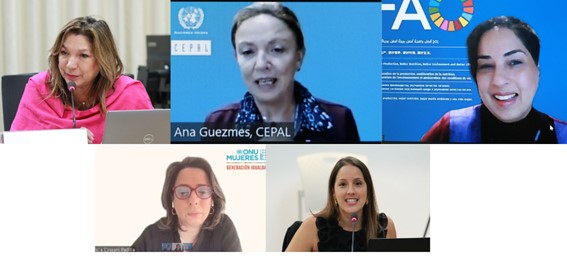Rural women are key to building a care society, ECLAC says
Work area(s)
Topic(s)
The Chief of the Division for Gender Affairs of the Economic Commission for Latin America and the Caribbean (ECLAC), Ana Güezmes, participated in the IV Forum of Ministers, Vice-Ministers and Senior Officials of the Americas. The event was organized by the Inter-American Institute for Cooperation on Agriculture (IICA) and took place at its headquarters in San José, Costa Rica, on August 22, with a view to highlighting the importance of the care economy in the region's agrifood systems.

"The different crises facing the Latin American and Caribbean region have reinforced the structural challenges of gender inequality, creating unfavorable conditions for women and limiting their autonomy.”To address these crises, ECLAC proposes moving towards a care society that puts the sustainability of life and the planet at the center. To achieve this, the meaningful participation of rural women, adolescents and girls in their diversity and the guarantee of their rights is key.
This was one of the reflections shared by Ana Güezmes, Chief of ECLAC’s Division for Gender Affairs, in Panel III “Actions from international cooperation for the promotion of comprehensive care systems for rural women”.
In her presentation, Ana Güezmes highlighted the unfair sexual division of labour. "In Latin America, women spend three times as much time on unpaid domestic and care work compared to the time spent by men," she said. She pointed out that there is also a significant gap between women in urban and rural areas, considering that the latter spend 3 to 10 hours more than those in urban areas". In agriculture, moreover, "there is a strong invisibilization of women's work, since it is considered as help instead of work. As a result, women's participation in the sector is underestimated. In Latin America, 14% of women working in the export sector work in the agriculture and livestock sector.”
Comprehensive care systems are of crucial importance, as was reflected in the III Forum of Women Ministers, Vice-Ministers and Senior Officials of the Americas. Care is a fundamental right, supported by the principles of gender equality and co-responsibility. This is essential to overcome inequalities in sectors such as agriculture, where women face discrimination despite their qualifications. Comprehensive care systems, with an intersectional and intercultural approach, must protect those who provide and receive care and enable women to participate fully in public and economic life, promoting their autonomy and equal opportunities, and fostering the construction of a more equitable and just society.
Specifically, the care society presents an opportunity to make visible the paid and unpaid work of women, adolescents and girls in rural areas and throughout agrifood systems; to recognize the diversity of women, their knowledge, their contribution to society and the economy and to address the intersectionality of discrimination; to redistribute care with social and gender co-responsibility in rural and community areas; and to overcome the sexual division of labour with access to resources, property, income and power.
Also participating in the panel were Cecilia Alemany, Deputy Regional Director for the Americas and the Caribbean of the United Nations Entity for Gender Equality and the Empowerment of Women (UN Women), Alejandra Mora Mora, Director of the Inter-American Commission of Women of the Organization of American States (OAS), Claudia Brito, Policy Officer and expert on Gender and Social and Institutional Systems of the Food and Agriculture Organization of the United Nations (FAO) and Priscila Zúñiga Villalobos, Manager of IICA's Gender Equity and Youth Program. The moderator was Nelly Paredes del Castillo, Minister of Agrarian Development and Irrigation of Peru.